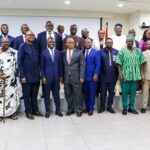The hallowed stool of the Ga Mantse, a symbol of heritage and authority for the Ga people of Ghana, has been a battleground of protracted chieftaincy disputes for decades, stifling development and fostering disunity.
A recent ruling by the Appeals Court in Kumasi has brought a new twist to this complex saga, yet it’s crucial to understand that while a battle may have been won, the war for ultimate legitimacy continues.
On 12 June 2025, the Appeals Court delivered a unanimous decision that has sent ripples through the Ga State and the nation’s traditional leadership. The court affirmed a 2021 High Court ruling, ordering the National House of Chiefs to re-enter Boni King Tackie Adama Latse II into the National Register of Chiefs as Ga Mantse.
The Appeals Court dismissed appeals from both the National House of Chiefs and a rival claimant, Nii Tetteh Ashong V, and significantly, slapped costs of GH₵30,000 and GH₵20,000 respectively on them.
This judgment has been met with understandable jubilation from the supporters of Nii Adama Latse II, who see it as a vindication of his claim. However, a crucial distinction must be made – and one that the Office of the current Ga Mantse, King Tackie Teiko Tsuru II, has been quick to emphasise.
According to their statement, the Appeals Court did not declare Nii Adama Latse II as the Ga Mantse in a substantive sense. Instead, the ruling was an administrative order (an order of mandamus) compelling the National House of Chiefs to follow due legal process in maintaining its register.
They assert that King Tackie Teiko Tsuru II was not a party to this specific Appeals Court case and remains the duly recognised and legitimate Ga Mantse, with the substantive issue of legitimacy still pending before the Judicial Committee.
Unpacking the Nuance: Administrative vs. Substantive
The heart of this ruling lies in its administrative nature. The Appeals Court is essentially telling the National House of Chiefs: “You did not follow proper procedure when you dealt with Nii Adama Latse II’s entry in your register, and you must correct that.”
It underscores the National House of Chiefs’ vital role in maintaining accurate records and adhering to established legal frameworks when dealing with chieftaincy registrations. The penalties imposed are a clear signal of the court’s displeasure with what it perceived as an administrative misstep.
However, this is not a declaration that Nii Adama Latse II is, by that ruling alone, the undisputed Ga Mantse. Chieftaincy disputes in Ghana are multifaceted, often involving intricate customary laws, the pronouncements of kingmakers, and judicial oversight.
The process of determining who is the rightful occupant of a stool often culminates in a decision by a Judicial Committee, which delves into the traditional and customary aspects of the succession.
The Road Ahead for the Ga State
The continuous strife over the Ga Mantse stool has taken a heavy toll on the Ga people, diverting attention and resources from critical development initiatives. While this latest court ruling marks a significant point in the ongoing legal battles, it necessitates a sober and forward-looking approach from all factions within the Ga State.
Here’s a pathway forward:
Embrace Understanding, Not Misinformation: All parties, and indeed the broader Ga populace, must clearly understand the precise nature of this ruling. It’s about an administrative directive, not a final pronouncement on who occupies the stool. Misinterpretations can only serve to deepen existing rifts.
Focus on the Substantive Judicial Process: Since the issue of ultimate legitimacy is acknowledged to be before the Judicial Committee, all energy and resources should be channelled into presenting compelling arguments before this body. Its eventual decision will be the most decisive step towards a resolution.
Prioritise Peace and Unity: The historical animosity born from these disputes must give way to a renewed commitment to peace and unity. The Ga State is bigger than any individual claim to the stool. Dialogue, mediation, and a spirit of compromise, however challenging, are essential.
Strengthen Internal Mechanisms: Relying solely on the courts can be a lengthy and often divisive process. The Ga State should actively work to strengthen its internal customary dispute resolution mechanisms. Respected elders and traditional leaders have a crucial role to play in fostering reconciliation.
Educate and Engage: Transparency and education are vital. The Ga people deserve to be fully informed about the legal processes and their implications, helping to manage expectations and prevent the spread of rumours.
Unite Behind the Legitimate Authority: Once a definitive and undisputed ruling emerges from the appropriate judicial body, all factions must put aside their differences and rally behind the legitimate Ga Mantse. This is crucial for the collective progress and development of the Ga State.
The Appeals Court ruling is a testament to the rule of law in Ghana’s traditional governance. However, true and lasting peace for the Ga State will not solely come from courtrooms.
It will emerge from a renewed commitment to dialogue, understanding, and a collective desire to move beyond decades of discord and build a unified, prosperous future for the Ga people. The time for genuine reconciliation is now.
Written by Raymond Ablorh, Policy, Strategy & Communication





